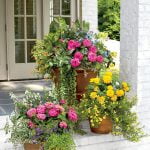Miniature fairy gardens are whimsical creations that bring a touch of magic and fantasy to any space. These enchanting miniature worlds have gained popularity as they offer a creative outlet for gardening enthusiasts and crafters alike. Incorporating elements like tiny fairy figurines, miniature houses, and lush greenery, these gardens allow individuals to unleash their imagination and create their own little mystical oasis.
The appeal of miniature fairy gardens lies in the opportunity to design and customize a small-scale fantasy world within limited space. Whether it’s a corner of your backyard, a windowsill, or even a tiny terrarium, these gardens offer endless possibilities for creativity and personalization. From intricate pathways to charming fairy accessories, the options are limitless when it comes to designing these magical landscapes.
As more people seek ways to connect with nature and express their love for all things whimsical, miniature fairy gardens have become a beloved trend in the gardening and DIY community. With the right combination of essential elements, plant selections, fairy accessories, and seasonal themes, you can easily transform any ordinary container into a captivating fairy realm that will spark joy and wonder in all who behold it.
Get ready to embark on a delightful journey into the world of miniature fairy gardens filled with endless enchantment and inspiration.
Essential Elements
Miniature fairy gardens have captured the hearts of gardeners and fantasy enthusiasts alike, offering a whimsical escape into a world of enchantment. These tiny gardens are designed to portray a miniature landscape fit for fairy residents, complete with magical elements that spark imagination and creativity. To create your own magical miniature fairy garden, there are essential elements that you will need to consider:
- Container: The container serves as the foundation for your fairy garden, providing a space for the magical scene to unfold. Options range from traditional pots and baskets to more unique choices like teacups, barrels, or even hollowed-out tree stumps.
- Plants: Selection of plants is crucial in creating a lush and vibrant backdrop for your fairy garden. Choose a mix of small-scale plants such as succulents, mosses, ferns, or miniature flowers. These plants not only add greenery but also help set the scene for your whimsical creation.
- Pathways & Stones: Incorporating pathways, stones, or pebbles can add charm and character to your miniature fairy garden. Create winding paths using small pebbles or tiny stepping stones to guide fairies on their magical journey through the garden.
In addition to these key components, fairy gardens often feature charming accessories that bring the scene to life. Delicate fairy figurines, tiny houses, whimsical furniture pieces like benches or swings, miniature fences, and even whimsical signs add personality and magic to your garden.
As you start planning and designing your miniature fairy garden, let your imagination run wild while considering these essential elements. By combining different components thoughtfully and creatively, you can craft a magical mini world that will delight both young and old alike with its wonder and whimsy. Let the magic of mini gardening transport you into an enchanted realm where fairies dance among the flowers and dreams come alive.
Container Selection
Miniature fairy gardens have captured the hearts of many gardening enthusiasts due to their whimsical and magical appeal. One key aspect of creating these enchanting miniature worlds is selecting the right container to house them. The choice of container not only affects the overall look of the fairy garden but also impacts its maintenance and longevity. When deciding on a container for your fairy garden, consider factors such as size, drainage, material, and aesthetics.
One of the most popular choices for miniature fairy gardens is using pots as containers. Clay pots are classic options that provide a rustic and charming look to the garden. They come in various sizes and shapes, allowing for creativity in designing unique layouts within the limited space. Additionally, clay pots typically have drainage holes at the bottom, which is essential for preventing waterlogged soil and maintaining plant health in the fairy garden.
Another versatile option for container selection is baskets. Woven baskets add a natural element to the miniature fairy garden and can easily be adapted to different themes or seasons by changing the accessories and plants within them. Wire baskets are another trendy choice that gives a more contemporary feel to the fairy garden design. Just make sure to line baskets with plastic or burlap before adding soil to prevent it from leaking out through any gaps in the weave.
Plant Selection
When it comes to creating a magical miniature fairy garden, one of the essential components to consider is the selection of plants. The right choice of plants can help set the tone and atmosphere of your enchanting garden. Here are some plant options that are perfect for miniature fairy gardens:
- Succulents: Succulents are an excellent choice for miniature fairy gardens due to their small size and low maintenance requirements. They come in various shapes and colors, adding a whimsical touch to your fairy garden.
- Mosses: Mosses are another popular plant option for miniature fairy gardens as they can create a lush and green landscape. They thrive in moist and shaded areas, making them ideal for adding texture and depth to your fairy garden.
- Small Flowers: Incorporating small flowering plants like mini petunias, tiny roses, or dwarf daisies can bring pops of color and fragrance to your miniature fairy garden. These delicate blooms can attract fairies and butterflies, adding an extra dose of magic.
Including a variety of plants in your miniature fairy garden not only creates visual interest but also provides a suitable environment for fairies to feel at home. Remember to consider the lighting conditions, watering needs, and growth habits of each plant when designing your fairy garden.
Whether you prefer a desert-themed fairy garden with succulents or a woodland-inspired one with mosses and wildflowers, the right combination of plants can transform your miniature space into an enchanting oasis. Experiment with different plant varieties and arrangements to create a whimsical world that captivates both young and old alike.
Visit your local nursery or garden center to explore more plant options for miniature fairy gardens. Gather inspiration from nature and get creative with your plant selection to bring your imaginative fairy garden to life.
Fairy Accessories
Fairy gardens are whimsical and charming miniature landscapes that have been gaining popularity among gardening enthusiasts. One of the key elements that can truly enhance the magical feel of a fairy garden is adding fairy accessories. These tiny figurines, houses, and other decorations bring a sense of enchantment and wonder to the miniature world you create.
When selecting fairy accessories for your garden, there are endless possibilities to explore. You can choose from a variety of fairy figurines in different poses and styles to populate your garden with mystical beings. Additionally, miniature houses designed to resemble fairy dwellings can be placed strategically among plants to create an enchanting scene. Other accessories like benches, lanterns, bridges, or even mini water features can add depth and character to your fairy garden.
To enhance the visual appeal of your miniature fairy garden, consider incorporating accessories like tiny fences, stepping stones, or even adorable animals like squirrels or rabbits. These little details not only add aesthetic interest but also help in creating a cohesive theme for your garden. Whether you prefer a woodland setting with rustic accents or a more whimsical design with colorful elements, choosing the right fairy accessories can truly elevate your fairy garden to a magical realm.
| Fairy Accessories | Examples |
|---|---|
| Fairy Figurines | Fairies in various poses and styles |
| Miniature Houses | Small dwellings resembling fairy homes |
| Additional Decorations | Bridges, benches, lanterns for added charm |
DIY Projects
Creating your own DIY accessories for miniature fairy gardens can add a personalized touch and make your magical garden truly unique. From tiny furniture to intricate pathways and charming fences, there are endless possibilities to let your creativity shine and bring your fairy garden to life.
Tiny Furniture
To start off, you can craft adorable miniature furniture pieces using materials like popsicle sticks, small pebbles, and even acorn caps. Consider making tiny tables and chairs, benches, swings, or even a cozy little hammock for the fairies to relax in. Paint them in bright colors or soft pastels to match the whimsical vibe of your fairy garden.
Pathways
Create enchanting pathways for the fairies to wander around by using small stones, pebbles, or even colorful glass beads. Lay out winding paths that connect different areas of your garden or create a cozy walkway leading up to a fairy house. You can also incorporate miniature stepping stones made from clay or cement for added charm.
Fences
Adding delicate fences to your miniature fairy garden can define different sections and add a quaint touch. Craft fences from twigs or thin branches secured together with twine or glue. You can also create picket fences using popsicle sticks or small wooden craft sticks painted in vibrant hues. Place them strategically around flower beds or fairy houses to enhance the whimsical atmosphere.
With these DIY projects, you can bring your imagination to life and customize your miniature fairy garden according to your preferences and style. Let these creative ideas inspire you to design a magical space filled with charm and wonder that will delight all who encounter it.
Seasonal Themes
When it comes to creating unique and enchanting miniature fairy gardens, incorporating seasonal themes is a wonderful way to add variety and interest throughout the year. Each season offers an opportunity to transform your fairy garden into a magical wonderland that reflects the beauty of nature during that time. By carefully choosing decorations and accessories that are relevant to the season, you can create a truly captivating display that will delight both adults and children alike.
For a summer-themed fairy garden, consider adding elements like miniature umbrellas, beach chairs, and tiny sandcastles to evoke a sunny seaside vibe. You can also incorporate vibrant flowers in warm hues such as reds, yellows, and oranges to create a cheerful atmosphere. Add some seashells or small pebbles for a coastal touch, and don’t forget to place a tiny sun hat on one of your fairy figurines for that perfect summer look.
As autumn rolls around, change up your fairy garden with seasonal decorations like pumpkins, scarecrows, and colorful leaves. Use miniature haystacks or wheelbarrows filled with tiny gourds for added charm. Consider planting miniature ornamental grasses or fall-blooming flowers like chrysanthemums to capture the essence of autumn in your garden. Adding small lanterns or fairy lights can also create a cozy ambiance as the days grow shorter.
Maintenance Tips
Maintaining a miniature fairy garden is essential to ensure the longevity and health of your magical creation. Proper care and attention to detail can help your miniature fairy garden thrive and continue to enchant all who admire it. In this section, we will provide valuable tips and tricks for caring for your tiny wonderland, including watering schedules, pruning techniques, and repotting guidelines.
Watering Tips
One of the most crucial aspects of caring for a miniature fairy garden is ensuring proper watering. Overwatering can lead to root rot, while underwatering can cause the plants to wither and die. It is important to strike a balance by checking the soil moisture regularly.
When watering your miniature fairy garden, use a small watering can with a narrow spout to avoid flooding the delicate plants. Ensure that the water reaches the roots of the plants without creating standing water in the container.
Pruning Techniques
Regular maintenance of your miniature fairy garden includes pruning or trimming overgrown plants to maintain their shape and size. Use small scissors or pruning shears to carefully trim any dead or yellowing leaves from the plants. You can also prune back any branches that are obstructing other plants or encroaching on pathways in your fairy garden. Be gentle when pruning to avoid damaging the plants’ delicate structures and maintain the whimsical appearance of your miniature fairy garden.
Repotting Guidelines
As your miniature fairy garden grows, some plants may outgrow their containers or become root-bound, requiring repotting. When repotting your fairy garden plants, choose a slightly larger container with drainage holes to allow excess water to escape easily. Gently remove the plant from its current pot, loosen any compacted roots, and place it in its new container with fresh potting soil.
Water thoroughly after repotting to help the plant adjust to its new home. Repotting periodically will help refresh the soil nutrients and give your plants room to grow in their magical environment.
By following these maintenance tips for your miniature fairy gardens, you can ensure that they remain enchanting and vibrant throughout each season. Remember that proper care and attention will result in a flourishing mini oasis filled with wonder and magic for years to come.
Showcase of Creative Ideas
Miniature fairy gardens have captured the hearts of many with their whimsical charm and ability to transport us into a magical world. These enchanting creations have become a popular trend among both experienced gardeners and beginners looking to add a touch of fantasy to their outdoor or indoor spaces. The key to creating a captivating miniature fairy garden lies in attention to detail and creativity, allowing for endless possibilities to bring these miniature worlds to life.
From tiny fairy houses nestled amongst lush greenery to intricate pathways leading to hidden nooks, the possibilities for designing miniature fairy gardens are truly endless. By incorporating a variety of plants like succulents, mosses, and small flowers, along with carefully selected accessories such as fairy figurines or mystical creatures, you can create a unique and mesmerizing scene that will captivate anyone who lays eyes on it.
Whether you prefer a woodland theme with rustic wooden accents or a more colorful and vibrant display filled with blooming flowers, there is no limit to the creativity that can be infused into these miniature marvels.
If you find yourself inspired by the idea of creating your own miniature fairy garden, remember that the key is to let your imagination run wild. Consider choosing a container that speaks to your aesthetic preference – whether it’s a whimsical teacup or a rustic wooden box – and select plants and accessories that complement each other harmoniously. And don’t forget about seasonal themes.
With the changing seasons, you can transform your miniature fairy garden into a winter wonderland with tiny snow-covered trees or celebrate spring with blooming flowers and cheerful fairy figurines. With some tender loving care and attention to detail, your miniature fairy garden is sure to become a delightful oasis of magic in your home or garden.
Frequently Asked Questions
How Do You Make a Mini Fairy Garden?
Making a mini fairy garden involves choosing a container, filling it with potting soil, and selecting small plants suitable for the environment. Decorative elements like miniature furniture, stones, and fairy figurines can then be added to create a whimsical scene.
What Do You Put in the Bottom of a Fairy Garden?
At the bottom of a fairy garden, it is important to use materials that promote good drainage to prevent waterlogging. This can include rocks or pebbles before adding potting soil. Additionally, some gardeners may use activated charcoal to help with moisture control.
What Do You Use for an Indoor Fairy Garden?
For an indoor fairy garden, you need to choose plants that thrive in low light conditions since they won’t be exposed to direct sunlight. Succulents, ferns, and moss are popular choices for indoor fairy gardens due to their ability to adapt to indoor environments. Additionally, decorative elements like tiny lanterns or mushrooms can add charm to the setup.

Welcome to my gardening blog! I am passionate about plants and enjoy sharing my knowledge and experiences with others. In this blog, I will write about everything related to gardening, from tips on how to get started to updates on my own garden projects.





